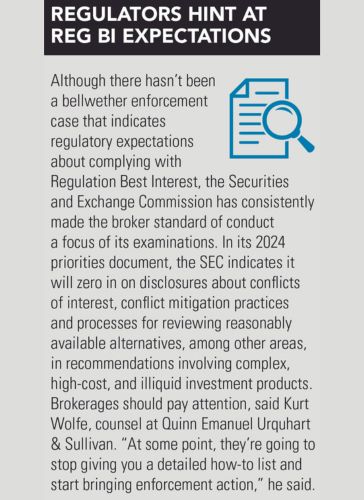

Ever since Regulation Best Interest went into force, financial advisors have been waiting to see how it would change the oversight of investment advice. They may get more insight this year.
The Securities and Exchange Commission implemented the broker-dealer standard of conduct in June 2020 during the Covid pandemic. The agency essentially gave financial firms a year’s grace period in which it expected a “good-faith” effort to come into compliance with the rule, which prohibits brokers from putting their revenue interests ahead of their clients’ interests in investment returns.
Starting in mid-2021, the SEC brought enforcement cases against firms that failed to file – or were delayed in filing – their Form CRS, a disclosure document that was part of the Reg BI rule-making package. In mid-2022, the SEC took its first substantive enforcement action in a case involving sales of risky bonds that were not a good fit for the customers who bought them.
But critics said that case – and others that have been brought since then by the SEC and the Financial Industry Regulatory Authority Inc. – could just as easily have been pursued under the previous suitability standard that Reg BI replaced. For instance, several of the enforcement actions have involved churning, a regulatory target that existed long before the advent of Reg BI.
The time may have come for an enforcement case that could only have been brought under Reg BI, said Sander Ressler, owner and managing director of Essential Edge Compliance Outsourcing Services.
“Regulators are looking at [Reg BI] very closely,” Ressler said. “This is going to be something that is going to be front and center in terms of regulatory actions in 2024.”
Ressler anticipates an enforcement case that is based on Reg BI’s care obligation, which requires that a broker understand the potential risks, rewards, and costs of a recommendation and whether it is in the customer’s best interests based on those factors. The broker also must consider reasonably available alternatives.
Whether brokers look at the investment landscape to see whether there are better and less expensive investments for customers is where regulators may zero in, Ressler said. For instance, they may look at whether a broker is evaluating a non-traded real estate investment trust against other non-traded REITs rather than against other private placements generally.
“Regulators are going to take a much heavier hand when it comes to reviewing apples-to-apples product comparisons and where firms may not be comparing like products,” Ressler said.
Other experts aren’t as sure the SEC will pursue a seminal Reg BI case this year.
“I think it’s difficult to predict,” said Kurt Wolfe, counsel at Quinn Emanuel Urquhart & Sullivan. “We have been expecting a wave of Reg BI cases for a couple years, and we just haven’t seen it, especially from the SEC. They don’t seem to be focusing on it.”
The Reg BI actions that the SEC and Finra have pursued haven’t relied on obligations that are unique to Reg BI, which means regulators aren’t signaling exactly what they want to see in terms of compliance.
“They are the types of cases that would have been filed with or without the rule,” said Amy Greer, a partner at K&L Gates. “Firms are left to comply as they believe the regulation requires. All we know is what regulators expect for Form CRS.”
The SEC has published three guidance documents about Reg BI that cover account recommendations, conflicts of interest, and care obligations.
Some firms are doing a better job of complying with Reg BI than others. But no one knows for sure whether regulators will agree with those who think they’ve got it right.
“We’re all still kind of winging it,” Ressler said.

In recent testimony before House lawmakers, Finra CEO Robert W. Cook said Reg BI sets a national standard of care with specific compliance obligations for disclosure, conflicts of interest, and care. By requiring that brokers act in the best interests of their clients, it sets regulatory expectations for them that are similar to those that apply to investment advisors, who continue to be held to a fiduciary standard.
“Most importantly, the SEC has created a uniform framework across broker-dealers and investment advisors where substantially similar obligations are owed to both,” Cook said at the December hearing. “From an investor perspective, that’s important. It shouldn’t matter where you go for your advice – you get the same protection.”
At the end of last year, Finra announced a $6 million settlement with LPL Financial in an action that included violations of Reg BI. It wasn’t the kind of uniquely Reg BI case that Ressler foresees coming this year, but he said it was a forceful reminder that the days of Reg BI leniency have passed.
“They’re not giving mulligans,” Ressler said.

AI is no replacement for trusted financial advisors, but it can meaningfully enhance their capabilities as well as the systems they rely on.

Prudential's Jordan Toma is no "Finfluencer," but he is a registered financial advisor with four million social media followers and a message of overcoming personal struggles that's reached kids in 150 school across the US.

GReminders is deepening its integration partnership with a national wealth firm, while Advisor CRM touts a free new meeting tool for RIAs.

The Texas-based former advisor reportedly bilked clients out of millions of dollars, keeping them in the dark with doctored statements and a fake email domain.

The $3.3 trillion tax and spending cut package narrowly got through the upper house, with JD Vance casting the deciding vote to overrule three GOP holdouts.
Orion's Tom Wilson on delivering coordinated, high-touch service in a world where returns alone no longer set you apart.
Barely a decade old, registered index-linked annuities have quickly surged in popularity, thanks to their unique blend of protection and growth potential—an appealing option for investors looking to chart a steadier course through today's choppy market waters, says Myles Lambert, Brighthouse Financial.
